Last week, I started talking about The Owl House and how much I liked it. The ensuing article wound up four thousand words so in the interest of getting an early night at some point this month, I decided to split it into two parts.
Here, have the other half.
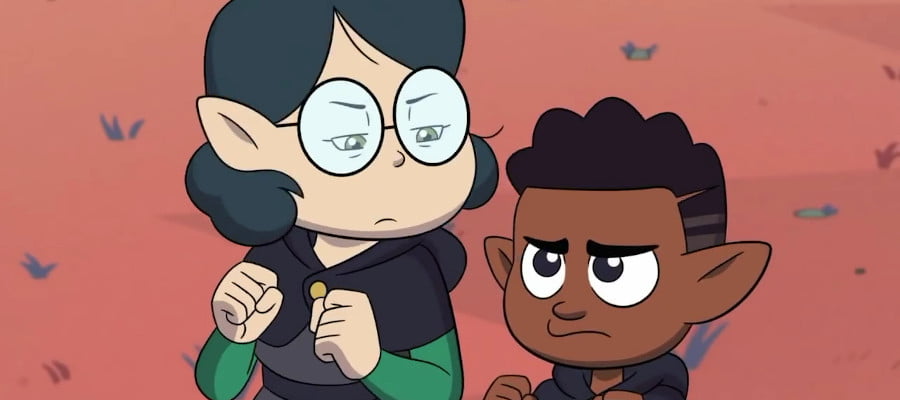
There’s Luz’s schoolfriends, Augustus and Willow. These characters let you do more worldbuilding, too. Willow develops the way plant magic works, shows how characters move around in the structures of the school, how you can start out in one discipline and move across to another as you develop that skillset. She’s a chubby girl who like roller derby (kinda) and has two gay dads and a past with Amity that is a plot point. Augustus is…
Like-
I don’t want to act like I’m the arbiter of these things but Augustus really looks a lot like the story of a neurodivergent kid who gets put into ‘gifted’ programs because the neurodivergence makes him test well, and then gets to suffer for ages because he doesn’t have the means to socially connect to his peer group who treat him badly because they perceive that ‘gifted’ status as exploitable!
Plus, then you have this neurodivergent character whose whole experience is about how he’s perceived and how people perceive things whose magical skillset is about illusion and controlling attention, and that’s really great too! And plays into that same plot point above with Amity and Willow!
These two characters get to develop the setting around them, they get to show you what’s normal. They’re kind of humanising elements of the setting where you, a person who may want, say, your own Owl House OC, might not really know what a ‘normal’ character looks like, and how they ‘normally’ go about their days.
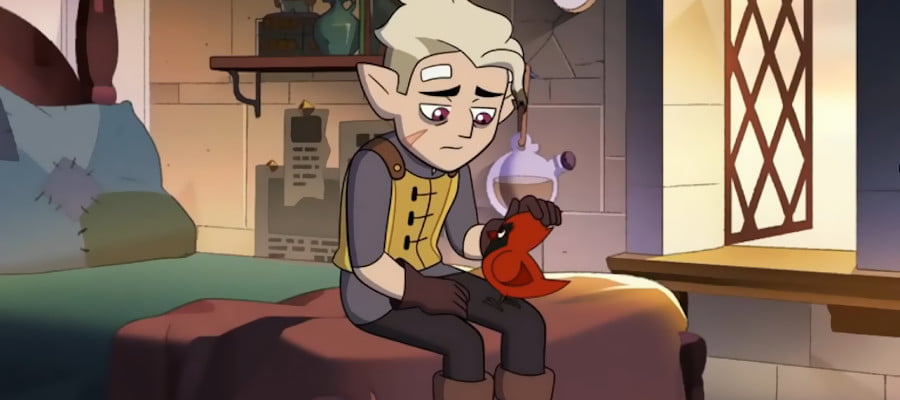
Oh man, this series has a Zuko, too, doesn’t it? I love Zukos! Not so much the tormented prince element, that’s more Fox’s thing, but Hunter hits on something that’s very true to me, too – he’s a damaged boy, who was raised by someone who made sure he didn’t understand the difference between love and fear. The story Hunter plays out is one of painful truths and gentle kindnesses, where it’s not enough to give him a chance.
No, this is one of the sad truths of a redemption arc; you kinda get a bunch of chances, not just one single big one, and that means your better self isn’t formed out of a single dramatic pivot, but often is instead the byproduct of day-by-day struggling as he realises that having friends feels good and the contention between doing what you’re told and having friends being a serious tension that ripples throughout whatever he does.
I love Hunter a lot. I love that they don’t pull punches on him; he’s easily led ‘astray’ from his (literally) puritanical upbringing, but he does keep going back to try and earn favour of his ‘dad’ figure. It’s absolutely painful and it’s incredibly familiar: All of that pain and that feeling of worthlessless is bound up inside him like a spool of spider’s thread, enough to make him sick as he imagines the possibility of not having worth.
There was always the fear, in my heart, that the story of Hunter, surrounded on all sides by a story of acceptance and love, would raise the elbow and drop down on but both sides in this situation are bad because… again, I feel like I had my expectations lowered by Steven Universe. I was afraid there’d be some point the story tried to reach that much like Amity, where her problem with her parents included a failure to communicate with her dad, so that meant in fact, Hunter was equally to blame and his dad figure wasn’t that bad.
But nope, they make it super clear that Hunter’s dad figure is an actual monster, and his friends are much more important because they help him learn what normal looks like. You don’t know what the abuse looks like when you’re inside it because it’s all you know.
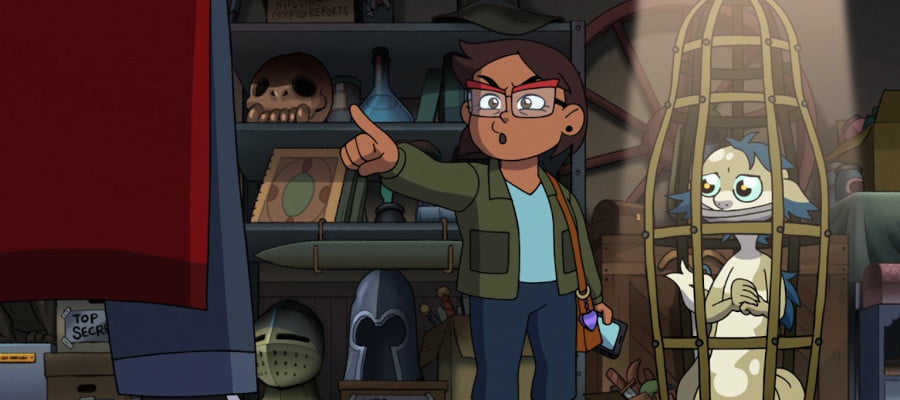
There’s also a bunch of minor character stuff I like? Like, there’s the funny way that the collector’s this bit part character who only shows up to do stuff in one episode and is otherwise a threat that only gets examined as a background feature… and their TVTropes page is eight thousand words long of just TvTropers getting completely brainwormsy about this character, as if anticipating some great revelation and otherwise just connecting them to every single remotely related idea.
We also get to see Vee in one story? A lovely little basilisk runaway that needs hugs and gets to choose how she looks and eats magical artifacts and she’s sweet and her whole episode is about showing that Luz’s mom can handle things getting weird but also that painful negotiation between weird kids and parents who are trying to be good parents. Because when you contrast with the actual bastard parents you see over in the Boiling Isles (hi, Odalia), the story runs the risk of getting into the idea that ‘parents are bad, actually.’
But instead, the story both handles a plot hole (how did Luz stay missing for so long?) and develops Camila. I have no doubt that in October we’ll learn more about her, but at the heart of Parents in these Kids Adventures is a tension between ‘parents are actually good’ and ‘parents are an impediment to the adventure.’ In The Owl House, Camila gets to illustrate a powerful third path: ‘Parents often have no idea what the hell they’re doing and every day of being a good parent is a negotiation. When she started, she wanted Luz to calm down; when she saw Luz again, all she wanted was for her to come home; and we can probably infer that it’s going to go another step as she lets Luz go on another adventure to rescue Eda.
I mean I’m guessing.
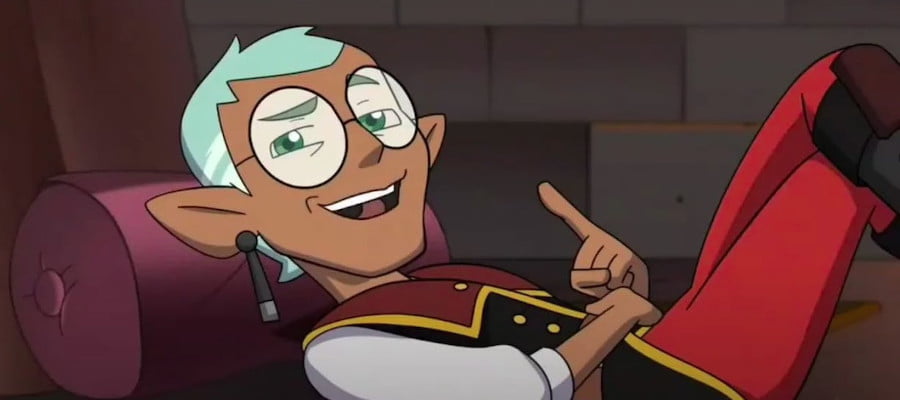
What about our two nonbinary gender princexes of the narrative? I refer of course to Raine Whispers and Hootie, who are both great, in entirely different ways. Though as I say that I realise the only reason I assume Hootie’s nonbinary is because it kind of seems a default assumption when dealing with what is technically a very large worm.
Anyway, like how with the tension between ‘parents good,’ and ‘parents bad,’ there’s the same negotiation with Raine, where the character uses a fairly low-key presentation and calm affect to bely a very thoughtful use of a character. Basically any time you present a character of Raine’s archetype, soft and thoughtful and kind of shy and withdrawn, you run the risk of making those characters fundamentally non-agents, provoked into action by the manic pixie dream energy of a character like Eda.
Raine shows that yeah, they are quite nice and shy and withdrawn but they aren’t bereft of their own agency. There’s stuff they’d do in the way they would do things, and that can even involve protecting other people who might do things more, ah… energetically? It’s a really nice back-and-forth, and it does one of those really cool things where you see this little detail early on that’s used for a storytelling beat and then later on is shown as a really big deal without ever being explicitly stated by anyone.
Oh and also there’s this nonbinary character who’s shown as being able to operate within a societal structural system while also recognising its problems like it’s not like you’re owed a particular presentation or form from someone else’s gender but maybe I’m just chasing a notion there.

I guess there’s an obligatory position to talk about Eda, because, you know, she’s one of the three major core characters of the story. She’s a middle aged junk witch who Is Gay and Does Crimes. Great work. No notes.
That’s of course not all there is to the character; I particularly like the way she and Lillith are presented as having a relationship that goes through multiple changes. Antagonistic, then that special kind of rage you can only get from family, then cautious, then apologetic, then slowly restored. It’s a really sweet arc and it’s nice to see a pair of women in their… forties? I think? Treated as if they aren’t locked into a relationship pattern, that their stories can also develop. Eda also gets to be central to one of the times the show really busts out the budget to do a fight scene and it’s really killer.
Oh yeah, Eda’s only like her mid forties. She’s shown as a teenager and says it was ‘thirty years ago.’
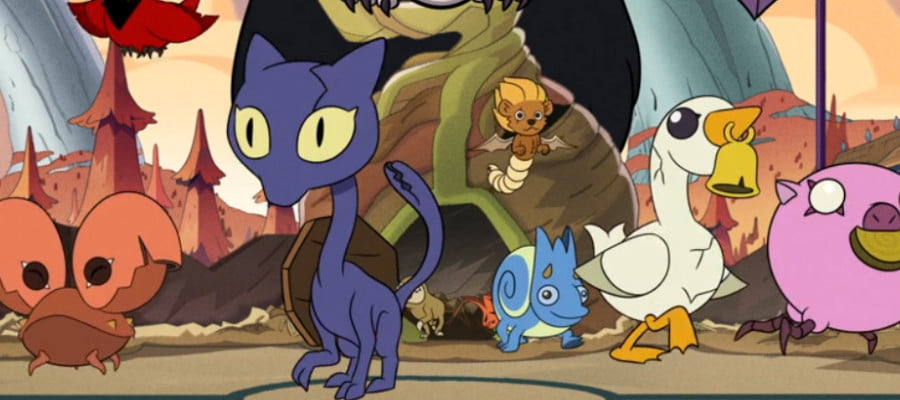
The entire idea of Palismen as something like a magic staff and a pokemon and an expression of your inner life takes other world’s visions of things like wands and just throws them in the dumpster. Palismen are great and I don’t just say that because one of the ones we see in the series is clearly an Untitled Goose Game Goose.
Palismen get to be your little cool pet, they shapeshift into your particular form of spellcaster staff, they can be your avenue to power if you don’t have any intuitively or they can be a thing that amplifies the ways you do magic. If we return to that idea of ‘how would I make an OC in this universe’ then holy hell Palismen are an amazing avenue for that.
This is one of those things that kinda makes me wish there was some sourcebook RPG coming out for The Owl House just because I want to see the kinds of examples of what a Palisman should be for a player character who has one. I can come up with my own, sure, but part of the point is getting a vibe for what the people who occupy this world thinks of as ‘normal’ – since we know that Hunter and Flapjack are kind of by definition not normal.
Just a real properly great character design hook for people who want to build in this universe.
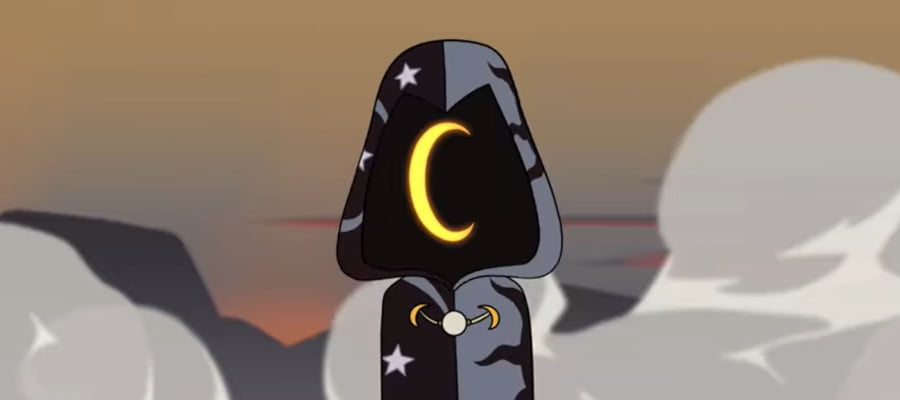
There’s more to it than just the characters and the magic system and the plot, of course. I mean that would be enough, really, a series doesn’t need to be made of bangers all the way down, but here we are, it’s The Owl House and they are delivering nothing but bangers.
Heck, there’s normally a feeling I get when I watch shows like this that I feel don’t really have it in them to see someone like me, or the characters I know. So often stories in this space want to talk about how, as a kid, you can affect the world, and also that we don’t want little kids to solve problems with violence. That maybe just because a lot of problems are Just Misunderstandings, that all problems are Just Misunderstandings.
But The Owl House trusts its audience enough to admit that there are evils in the world. There are bitter old men who want to destroy the world to get rid of the magic they see as unnatural. There are conspiracists who care more about being right than about caring for people. There are businesses that want to extract wealth from you and you’re best off not falling in with them. And that it is entirely possible to be born into these systems, to be elevated within them, and to yet recognise what’s wrong with them and want to end them.

Yeah.
The Owl House.
It’s a really, really good show. I like it. A lot. I think that it’s worth watching if you like episodic kid’s cartoons with room for a long-form multi-episode plot about found families and fighting against fundamentalism and the importance of loving yourself and your friends and being true to that. The ending of the series at the moment is kind of heartbreaking but also kind of awesome — leaving an enormous cliffhanger, but with the emotional arc of the series already set up to make it clear that the way this series works is going to make things work out, even if we don’t get to see it.
Good job, Disney.
Now do it again.